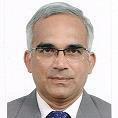
Venkat Subramaniam
Work place: Department of Electronics,PSG College of Arts & Science, Coimbatore, 641 014, India
E-mail:
Website:
Research Interests: Physics, Physics & Mathematics, Computational Physics
Biography
Dr. Venkat Subramaniam received his Master’s degree and Ph.D. degree from the Physics Department at Bharathiyar University in 1986 and 2011, respectively. He has been Professor from 1987 to till date in the Department of Electronics at PSG College of Arts and Science, Coimbatore, Tamil Nadu, India. He has served as chairman, Board of Examiners for PhD/Mphil and PG at Bharathiar University, Coimbatore and Bharathidasan University, Trichy respectively. He has served as member, Board of Examiners for Madurai Kamaraj University,Madurai and Periyar University,Salem. He has served as Vidyalaya Management Committee Member (twice), Kendriya Vidyalaya, HRD Ministry, Govt. of India.
Author Articles
An Automatic Dual Axis Sun Tracker and Temperature Monitoring System for Novel Solar Dish Concentrator
By Krishna Kumar.N Venkat Subramaniam
DOI: https://doi.org/10.5815/ijem.2018.01.02, Pub. Date: 8 Jan. 2018
Nonpolluting, renewable energy can be harnessed from the sun using solar thermal concentrator and photovoltaic systems. A novel asymmetric oblique compound conical solar concentrator was designed and constructed with automatic solar tracking system. The experimental study of the developed system was carried out to inspect the efficiency of the designed solar concentrator and automatic azimuth and altitude tracking. In this solar tracking, the RTC (Real Time clock) based active solar tracking method is used to track the sun in order to attain the maximum temperature. A simple microcontroller based control system is used to control this open loop solar tracking system, further the concentrated thermal power was measured using both the K-type temperature sensor and thermometer gun. The temperature obtained at the receiver of solar concentrator is sent to the measurement unit using GSM wireless module available at remote location. The monitoring unit receives the temperature values and recoded them regularly. Besides, the maximum average solar thermal power of the system was observed to be during 10.00 AM to 3.00 PM. This temperature is useful for various heating applications.
[...] Read more.Other Articles
Subscribe to receive issue release notifications and newsletters from MECS Press journals